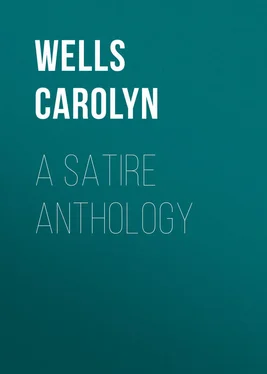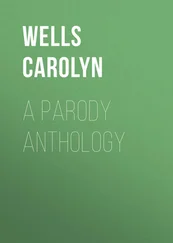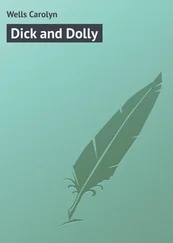Carolyn Wells - A Satire Anthology
Здесь есть возможность читать онлайн «Carolyn Wells - A Satire Anthology» — ознакомительный отрывок электронной книги совершенно бесплатно, а после прочтения отрывка купить полную версию. В некоторых случаях можно слушать аудио, скачать через торрент в формате fb2 и присутствует краткое содержание. Жанр: Юмористические книги, foreign_humor, на английском языке. Описание произведения, (предисловие) а так же отзывы посетителей доступны на портале библиотеки ЛибКат.
- Название:A Satire Anthology
- Автор:
- Жанр:
- Год:неизвестен
- ISBN:нет данных
- Рейтинг книги:5 / 5. Голосов: 1
-
Избранное:Добавить в избранное
- Отзывы:
-
Ваша оценка:
- 100
- 1
- 2
- 3
- 4
- 5
A Satire Anthology: краткое содержание, описание и аннотация
Предлагаем к чтению аннотацию, описание, краткое содержание или предисловие (зависит от того, что написал сам автор книги «A Satire Anthology»). Если вы не нашли необходимую информацию о книге — напишите в комментариях, мы постараемся отыскать её.
A Satire Anthology — читать онлайн ознакомительный отрывок
Ниже представлен текст книги, разбитый по страницам. Система сохранения места последней прочитанной страницы, позволяет с удобством читать онлайн бесплатно книгу «A Satire Anthology», без необходимости каждый раз заново искать на чём Вы остановились. Поставьте закладку, и сможете в любой момент перейти на страницу, на которой закончили чтение.
Интервал:
Закладка:
THE RELIGION OF HUDIBRAS
FOR his religion it was fit
To match his learning and his wit:
Twas Presbyterian true blue;
For he was of that stubborn crew
Of errant saints, whom all men grant
To be the true Church militant;
Such as do build their faith upon
The holy text of pike and gun;
Decide all controversies by
Infallible artillery,
And prove their doctrine orthodox,
By apostolic blows and knocks;
Call fire, and sword, and desolation,
A godly, thorough reformation.
Which always must be carried on,
And still be doing, never done;
As if religion were intended
For nothing else but to be mended;
A sect whose chief devotion lies
In odd perverse antipathies;
In falling out with that or this,
And finding somewhat still amiss;
More peevish, cross, and splenetic,
Than dog distract or monkey sick;
That with more care keep holy-day
The wrong, than others the right way;
Compound for sins they are inclin’d to,
By damning those they have no mind to;
Still so perverse and opposite,
As if they worshipped God for spite;
The self-same thing they will abhor
One way, and long another for;
Free-will they one way disavow,
Another, nothing else allow;
All piety consists therein
In them, in other men all sin;
Rather than fail, they will defy
That which they love most tenderly;
Quarrel with minc’d pies, and disparage
Their best and dearest friend, plum porridge;
Fat pig and goose itself oppose,
And blaspheme custard through the nose.
SATIRE ON THE SCOTS
A LAND where one may pray with cursed intent,
Oh, may they never suffer banishment!
Had Cain been Scot, God would have chang’d his doom —
Not forc’d him wander, but confin’d him home.
Like Jews they spread and as infection fly,
As if the devil had ubiquity;
Hence ’tis they live as rovers, and defy
This or that place, rags of geography;
They’re citizens o’ th’ world, they’re all in all;
Scotland’s a nation epidemical.
And yet they ramble not to learn the mode
How to be drest, or how to lisp abroad…
No, the Scots errant fight, and fight to eat;
Their ostrich-stomachs make their swords their meat;
Nature with Scots as tooth-drawers hath dealt,
Who use to string their teeth upon their belt…
Lord! what a godly thing is want of shirts!
How a Scotch stomach and no meat converts!
They wanted food and raiment; so they took
Religion for their seamstress and their cook.
Unmask them well, their honours and estate,
As well as conscience, are sophisticate.
Shrive but their title and their moneys poize,
A laird and twenty pence pronounc’d with noise,
When constru’d but for a plain yeoman go,
And a good sober twopence, and well so.
Hence, then, you proud impostors! get you gone,
You Picts in gentry and devotion,
You scandal to the stock of verse – a race
Able to bring the gibbet in disgrace!
Hyperbolus by suffering did traduce
The ostracism, and sham’d it out of use.
The Indian that heaven did forswear,
Because he heard some Spaniards were there,
Had he but known what Scots in hell had been,
He would, Erasmus-like, have hung between.
My muse hath done. A voyder for the nonce,
I wrong the devil should I pick their bones;
That dish is his; for when the Scots decease,
Hell, like their nation, feeds on barnacles.
A Scot when from the gallow-tree got loose,
Drops into Styx, and turns a Soland goose.
SONG
WHY should you swear I am forsworn,
Since thine I vowed to be?
Lady, it is already morn,
And ’twas last night I swore to thee
That fond impossibility.
Have I not loved thee much and long,
A tedious twelve hours’ space?
I must all other beauties wrong,
And rob thee of a new embrace,
Could I still dote upon thy face.
Not but all joy in thy brown hair
By others may be found;
But I must search the black and fair,
Like skilful mineralists that sound
For treasure in unploughed-up ground.
Then, if when I have loved my round,
Thou prov’st the pleasant she;
With spoils of meaner beauties crowned,
I laden will return to thee,
Even sated with variety.
THE CHARACTER OF HOLLAND
HOLLAND, that scarce deserves the name of land,
As but the off-scouring of the British sand,
And so much earth as was contributed
By English pilots when they heaved the lead;
Or what by th’ ocean’s slow alluvion fell,
Of shipwrecked cockle and the mussel-shell;
This indigested vomit of the sea
Fell to the Dutch by just propriety.
Glad then, as miners who have found the ore,
They, with mad labour, fished the land to shore;
And dived as desperately for each piece
Of earth as if ’t had been of ambergreese;
Collecting anxiously small loads of clay,
Less than what building-swallows bear away;
Or than those pills which sordid beetles roll,
Transfusing into them their dunghill soul.
How did they rivet, with gigantic piles,
Thorough the centre their new-catched miles;
And to the stake a struggling country bound,
Where barking waves still bait the forcéd ground;
Building their watery Babel far more high
To reach the sea, than those to scale the sky.
Yet still his claim the injured ocean laid,
And oft at leap-frog o’er their steeples played;
As if on purpose it on land had come
To shew them what’s their mare liberum .
A daily deluge over them does boil;
The earth and water play at level-coil.
The fish ofttimes the burgher dispossessed,
And sat, not as a meat, but as a guest;
And oft the Tritons and the sea-nymphs saw
Whole shoals of Dutch served up for cabillau;
Or, as they over the new lever ranged,
For pickled herring, pickled heeren changed.
Nature, it seemed, ashamed of her mistake,
Would throw their land away at duck and drake,
Therefore necessity, that first make kings,
Something like government among them brings;
For, as with pigmies, who best kills the crane,
Among the hungry he that treasures grain,
Among the blind the one-eyed blinkard reigns,
So rules among the drowned he that drains.
Not who first see the rising sun commands,
But who could first discern the rising lands.
Who best could know to pump an earth so leak,
Him they their Lord and Country’s Father speak.
To make a bank was a great plot of state;
Invent a shovel, and be a magistrate.
Hence some small dike-grave unperceived invades
The power, and grows, as ’twere, a king of spades;
But, for less envy, some joined states endures,
Who look like a commission of the sewers:
For these Half-anders, half wet, and half dry,
Nor bear strict service, nor pure liberty.
’Tis probable religion, after this,
Came next in order, which they could not miss.
How could the Dutch but be converted, when
The apostles were so many fishermen?
Besides, the waters of themselves did rise,
And, as their land, so them did rebaptize.
THE DUKE OF BUCKINGHAM
SOME of their chiefs were princes of the land:
In the first rank of these did Zimri stand,
A man so various that he seemed to be
Not one, but all mankind’s epitome:
Stiff in opinions, always in the wrong,
Was everything by starts, and nothing long;
But, in the course of one revolving moon,
Was chymist, fiddler, statesman, and buffoon;
Then all for women, painting, rhyming, drinking,
Besides ten thousand freaks that died in thinking.
Blest madman, who could every hour employ
With something new to wish or to enjoy!
Railing and praising were his usual themes,
And both, to shew his judgment, in extremes;
So over-violent, or over-civil,
That every man with him was god or devil.
In squandering wealth was his peculiar art;
Nothing went unrewarded but desert:
Beggared by fools, whom still he found too late,
He had his jest, and they had his estate;
He laughed himself from court, then sought relief
By forming parties, but could ne’er be chief;
For, spite of him, the weight of business fell
On Absalom and wise Achitophel.
Thus, wicked but in will, of means bereft,
He left not faction, but of that was left.
Интервал:
Закладка:
Похожие книги на «A Satire Anthology»
Представляем Вашему вниманию похожие книги на «A Satire Anthology» списком для выбора. Мы отобрали схожую по названию и смыслу литературу в надежде предоставить читателям больше вариантов отыскать новые, интересные, ещё непрочитанные произведения.
Обсуждение, отзывы о книге «A Satire Anthology» и просто собственные мнения читателей. Оставьте ваши комментарии, напишите, что Вы думаете о произведении, его смысле или главных героях. Укажите что конкретно понравилось, а что нет, и почему Вы так считаете.












